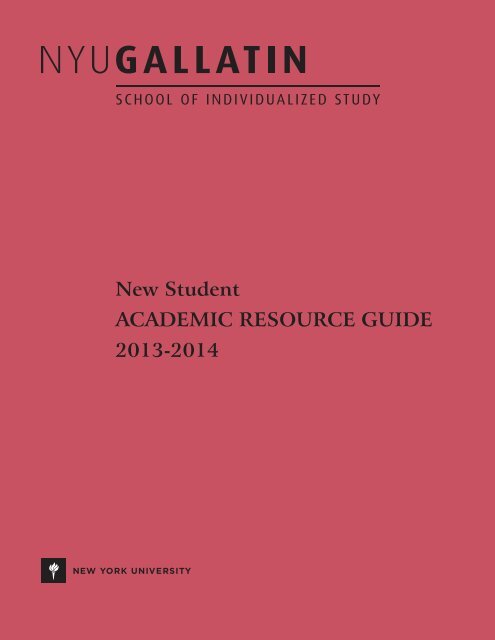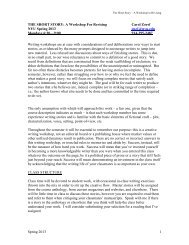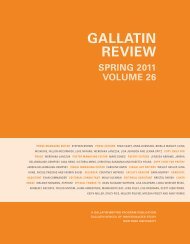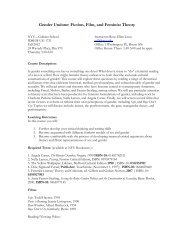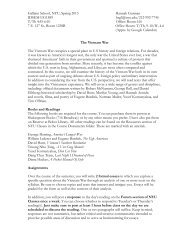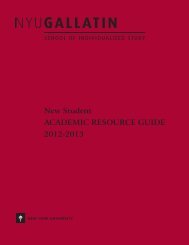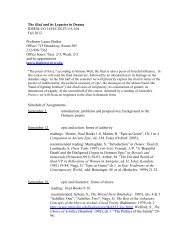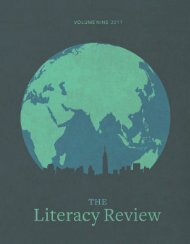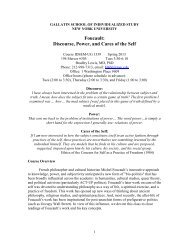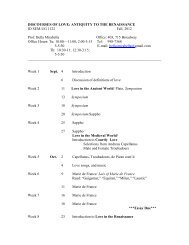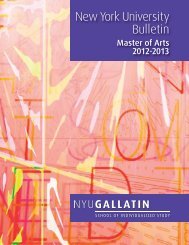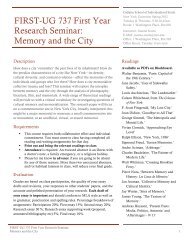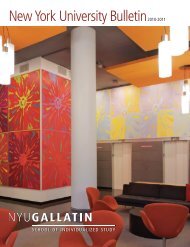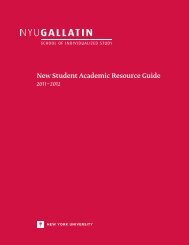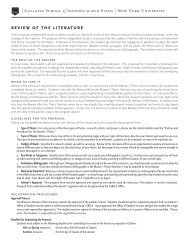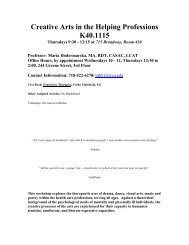New Student ACADEMIC RESOURCE GUIDE 2013-2014
New Student ACADEMIC RESOURCE GUIDE 2013-2014
New Student ACADEMIC RESOURCE GUIDE 2013-2014
You also want an ePaper? Increase the reach of your titles
YUMPU automatically turns print PDFs into web optimized ePapers that Google loves.
<strong>New</strong> <strong>Student</strong><br />
<strong>ACADEMIC</strong> <strong>RESOURCE</strong> <strong>GUIDE</strong><br />
<strong>2013</strong>-<strong>2014</strong>
Academic Resource Guide<br />
Preparing for Gallatin<br />
Welcome!<br />
All of us at Gallatin—faculty, administrators, staff and students—are happy you chose to<br />
study here. Gallatin students are known as independent and innovative individuals. We are<br />
sure you will fit right in!<br />
This Academic Resource Guide is designed to help you make an easy transition into Gallatin.<br />
Regardless of whether you are a first-year student entering from high school, a transfer<br />
student from another NYU school, or a transfer student from another college or university, it<br />
is important that you know and understand Gallatin’s intellectual values, academic offerings<br />
and administrative support structures.<br />
Use this Guide to prepare for registration, Orientation and your first semester at Gallatin.<br />
It will help you understand how you can best use Gallatin’s unique curriculum and flexible<br />
administrative policies to create your own program of individualized study. It will also help<br />
you prepare for the discussions that you will have with your academic adviser. As you will<br />
learn, your adviser will play a key role in helping you shape your Gallatin education. Finally,<br />
this Guide describes some of NYU’s many online resources; if you are new to NYU, you<br />
should spend a few hours familiarizing yourself with them. We hope you find the Academic<br />
Resource Guide useful, and we look forward to meeting you!<br />
Susanne Wofford<br />
Dean<br />
Lisa Goldfarb<br />
Associate Dean for Faculty and Academic Affairs<br />
Kimberly DaCosta<br />
Associate Dean of <strong>Student</strong>s<br />
<strong>New</strong> <strong>Student</strong> Academic Resource Guide<br />
1
Developing Your “Plan of Study”<br />
At Gallatin, we use the term “Plan of Study” in two<br />
different ways. Broadly, it refers to your “concentration”—<br />
the array of courses, independent studies, internships and<br />
other learning experiences that you and your adviser shape<br />
into your own individualized program. In this sense, every<br />
Gallatin student’s plan of study is unique. Second, and<br />
more specifically, the “Plan of Study” is the registration<br />
form that you will complete every semester.<br />
With few requirements and a wide range of opportunities,<br />
Gallatin allows its students a great deal of autonomy in<br />
developing their concentrations. With their advisers’<br />
help, Gallatin students design concentrations that take<br />
into account their unique backgrounds, interests and<br />
goals. These individualized programs typically combine<br />
Gallatin courses with classes in other NYU schools, as<br />
well as independent studies and internships. As you plan<br />
your program each semester, your adviser will assist you in<br />
making informed academic choices while supporting you<br />
as you take responsibility for your own education.<br />
Each semester, you will be asked to articulate your<br />
educational goals and plans for realizing them by filling<br />
out a “Plan of Study” form, listing your proposed courses<br />
for the semester and writing a thoughtful description of<br />
your short- and long-term academic goals.<br />
Along the way, be sure to familiarize yourself with the<br />
NYU lingo. For example, while some universities calculate<br />
a student’s courseload in “credits” or “points,” NYU does<br />
so in “units.” Most NYU courses are 4 units each, and the<br />
average load is four courses (16 units) per semester.<br />
Remember your Gallatin requirements. As a Gallatin<br />
student, your goal is to develop your interests and build a<br />
concentration while simultaneously fulfilling the Core and<br />
Foundation requirements. (See page 9 for details.)<br />
The Role of the Adviser<br />
Strong academic advising will be a key component of<br />
your Gallatin education. Two advisers in particular—your<br />
primary adviser and your class adviser—will help you<br />
construct your program of individualized study.<br />
Your primary adviser will help you develop a concentration<br />
each semester. He or she may supervise your independent<br />
studies and internships. In your junior and senior years,<br />
your primary adviser will help you conceptualize and plan<br />
for your Colloquium—the student-designed oral exam<br />
that serves as the capstone requirement for every Gallatin<br />
undergraduate student.<br />
Whether you are a first-year or transfer student, you will<br />
be assigned to a primary adviser in your area of academic<br />
interest. Should your area of interest change, you will be<br />
able to switch advisers in a future semester.<br />
Your class adviser supports both you and your primary<br />
adviser, answering administrative questions you have and<br />
helping you navigate NYU’s systems. If your primary<br />
adviser is temporarily unavailable, your class adviser will<br />
help answer your substantive academic questions. In short,<br />
both the primary and class advisers work to ensure that<br />
your program not only has depth, breadth and coherence<br />
but also is consistent with your educational and career<br />
goals.<br />
NOTE: Your Gallatin advisers are academic advisers. If<br />
you have questions about non-academic issues such as<br />
tuition, financial aid or housing, you should contact the<br />
appropriate NYU office. (See page 15 for a list of these.)<br />
If you still have trouble finding answers to these nonacademic<br />
questions, you should contact Gallatin’s Office of<br />
<strong>Student</strong> Services at (212) 998-7378 for assistance.<br />
Information Just for First-Year<br />
<strong>Student</strong>s: The First Semester<br />
We do not expect you to be able to explain your<br />
concentration in your first semester. Indeed, you should<br />
use your entire first year to explore some of the many<br />
intellectual opportunities that NYU has to offer. Keep<br />
an open mind as you talk with faculty, advisers and<br />
other Gallatin students and as you peruse NYU’s course<br />
offerings. This process may help you discover a subject you<br />
want to pursue in greater depth.<br />
First-Year Interdisciplinary Seminar: All Gallatin<br />
freshmen must take one of the First-Year Interdisciplinary<br />
Seminars in the fall semester. These courses are<br />
intended to introduce students to the goals, methods<br />
and philosophy of university education and to the<br />
interdisciplinary, individualized approach of Gallatin.<br />
First-Year Writing Seminar: All students must take a<br />
First-Year Writing Seminar in the fall semester and a First-<br />
Year Research Seminar in the spring. NOTE: A score of 4 or<br />
higher on the English Literature Advanced Placement (AP)<br />
exam gives you 4 units towards the 128 units needed to<br />
graduate, but does not exempt you from taking Gallatin’s<br />
writing seminars.<br />
Descriptions of all First-Year courses in the Fall semester<br />
can be found on our website at: www.gallatin.nyu.edu/<br />
academics/courses.html (filter by Year, Semester, and Course<br />
Type).<br />
2<br />
NYU GALLATIN SCHOOL OF INDIVIDUALIZED STUDY
NOTE: You are not permitted to enroll in internships,<br />
independent studies or tutorials in your first semester. You<br />
will have plenty of time for these non-classroom projects<br />
later.<br />
In addition to your required first-year courses, it’s a<br />
good idea to devote some of your first year to fulfilling<br />
the liberal arts component of Gallatin’s foundation<br />
requirement, which includes:<br />
• 8 units in the Humanities<br />
such as art history, classics, history, languages, literature,<br />
philosophy, music history and religious studies<br />
• 8 units in the Social Sciences<br />
such as anthropology, economics, journalism, politics,<br />
psychology, sociology and gender studies<br />
• 4 units in a Science or Math<br />
such as biology, chemistry, environmental science, physics,<br />
computer science and mathematics.<br />
While you are not expected to fulfill the historical and<br />
cultural component of the foundation requirement during<br />
your first semester or even in your first year at Gallatin,<br />
you should keep this requirement in mind as you develop<br />
your concentration:<br />
• 4 units in pre-modern studies<br />
• 4 units in early modern studies<br />
• 4 units in global cultures<br />
<strong>Student</strong>s may satisfy the foundation requirement by taking<br />
select Gallatin interdisciplinary seminars, as well as courses<br />
in the College of Arts and Science. For more information<br />
about the foundation requirement, see: http://gallatin.nyu.<br />
edu/academics/undergraduate/requirements.html<br />
Orientation: First-year students have a comprehensive<br />
Orientation during Welcome Week, which is the week<br />
before classes begin. Some Orientation activities will be led<br />
by Orientation Leaders, continuing students who will help<br />
you connect with communities and resources at Gallatin<br />
and NYU. Welcome Week also includes Convocation, the<br />
primary scholarly event at Gallatin marking the beginning<br />
of each academic year. You will receive more information<br />
about Welcome Week over the summer.<br />
Information Just for Transfer<br />
<strong>Student</strong>s: The First Semester<br />
As a new transfer student, you will be joining Gallatin at<br />
a crucial stage in your college career. You will be able to<br />
sample many of the intellectual opportunities that NYU<br />
and <strong>New</strong> York have to offer, but you should also strive to<br />
focus your education in creative and challenging ways.<br />
The ideal semester will be different for every Gallatin<br />
student, but here are some general pointers on how to<br />
construct your plan of study:<br />
Work closely with your advisers. As a transfer student<br />
just entering Gallatin, you will begin your advising<br />
relationship with the transfer adviser, who will guide<br />
you in choosing courses that fulfill your academic goals<br />
and interests. When the semester begins, you will be<br />
assigned to a primary academic adviser. Maintain good<br />
communication with both of these people as they can<br />
direct you to a host of useful resources.<br />
Learn about NYU. In order for you to locate courses<br />
that speak to your interests, you will need to understand<br />
NYU’s academic structures. <strong>Student</strong>s interested in<br />
literature, for example, will need to learn that a number<br />
of different departments at NYU offer courses in writing<br />
and literature: English, Comparative Literature, Dramatic<br />
Writing, all of the foreign language departments, Social<br />
and Cultural Analysis, and Gallatin itself. (See pages 10<br />
and 11 of this Guide for a complete list of departments<br />
where Gallatin students take courses.)<br />
Choose courses that require different kinds of<br />
learning. Too much of a good thing can be too much:<br />
Taking four courses that demand a lot of reading and<br />
writing can make for a term that seems repetitive and<br />
exhausting. Think about taking a course in Art, Music or<br />
Math—or whatever might stretch your mind and change<br />
your academic routine.<br />
Save materials that document the introductory<br />
courses you have taken. Most NYU departments that<br />
offer upper-level courses require that you fulfill necessary<br />
introductory courses first. Your NYU transcript will not<br />
indicate exactly which courses you completed at another<br />
institution, so you should save copies of earlier transcripts.<br />
These will usually suffice if a department wants to<br />
ascertain that you actually completed Intro to Psychology<br />
or Economic Principles II elsewhere.<br />
Begin thinking about your Intellectual<br />
Autobiography and Plan for Concentration (IAPC):<br />
Before completing your 64th unit, you will need to<br />
write and obtain your primary adviser’s approval on a<br />
2- to 3-page essay in which you review your intellectual<br />
development and identify how you will complete your<br />
program of study. Many transfer students must complete<br />
the IAPC at the end of their first semester in Gallatin,<br />
so it is important to think about this requirement<br />
early. Gallatin’s Office of Academic Advising will offer<br />
workshops and other assistance throughout the year to<br />
help you.<br />
<strong>New</strong> <strong>Student</strong> Academic Resource Guide<br />
3
Orientation: Transfer students have a comprehensive<br />
Orientation before the semester begins. As part of<br />
Orientation, continuing students will help you understand<br />
the many communities and resources that exist at Gallatin<br />
and NYU. You will receive more information about<br />
Orientation prior to the beginning of classes.<br />
Academic Opportunities At and<br />
After Gallatin<br />
Study Away: Many Gallatin students find that study<br />
away helps them flesh out or enhance their concentrations.<br />
Whether you spend four weeks in Florence for a Gallatin<br />
Summer Humanities Seminar or an entire semester in<br />
Buenos Aires studying Latin American political economy<br />
and the Spanish language, you can expect to return<br />
to NYU’s Washington Square campus with far more<br />
intellectual knowledge and cultural insight than when you<br />
left.<br />
NYU sends more undergraduate students abroad than<br />
any other university in the United States. The “Global<br />
Network University” has campuses in Abu Dhabi, Accra,<br />
Berlin, Buenos Aires, Florence, London, Madrid, Paris,<br />
Prague, Shanghai, Sydney, Tel Aviv and Washington,<br />
D.C. In addition, it has exchange relationships with<br />
several universities around the world and offers dozens<br />
of specialized summer, inter-session and semester-long<br />
programs.<br />
First-year Gallatin students may participate in<br />
international study beginning in their sophomore year.<br />
Transfer students may participate beginning in their<br />
second full semester. For information about any of the<br />
programs above, go to: http://www.nyu.edu/admissions/studyabroad.html.<br />
In addition, Gallatin usually runs several international<br />
summer programs, and we occasionally permit students<br />
to enroll in programs not affiliated with NYU and then<br />
transfer back the units. For more information about either<br />
option, visit: www.gallatin.nyu.edu/academics/undergraduate/<br />
global.html.<br />
Declaration of a Minor: Gallatin students are permitted,<br />
but not required, to declare one academic minor. When<br />
fulfilled, the minor will appear on the student’s transcript.<br />
A list of possible minors may be found at http://www.nyu.<br />
edu/students/undergraduates/academic-services/undergraduateadvisement/unique-academic-opportunities/cross-school-minors.<br />
html. The typical minor consists of a minimum of 16 to<br />
20 units. The exact number of units and minimum grade<br />
requirement are determined by the program in which<br />
the minor is offered. Please note that declaring a minor<br />
requires your adviser’s approval and that not all minors are<br />
open to Gallatin students. For more information about the<br />
general feasibility of declaring a minor, see: www.gallatin.<br />
nyu.edu/academics/undergraduate/universitycourses.html.<br />
Gallatin-Wagner Dual-Degree Program: Gallatin<br />
and NYU’s Robert F. Wagner Graduate School of Public<br />
Service have established a dual-degree program to enable<br />
students to earn both a Bachelor of Arts in Individualized<br />
Study and a Master of Public Administration (MPA) in<br />
Public and Nonprofit Management or in Health Policy and<br />
Management. This dual degree is designed for students<br />
with a strong commitment to public leadership. It allows<br />
such students to enhance and focus their opportunities<br />
for learning, while helping them to create meaningful<br />
careers in public service. <strong>Student</strong>s enter the program<br />
while enrolled as undergraduates in Gallatin and may<br />
complete a maximum of 28 of the 60 credits required<br />
for the Wagner MPA while they are still undergraduates.<br />
For more information, see: http://gallatin.nyu.edu/academics/<br />
undergraduate/universitycourses/BA-MPA.html<br />
Gallatin-Environmental Studies Partnership: Gallatin<br />
students in good standing who have completed between<br />
16 and 80 units may elect to participate in the Gallatin-<br />
Environmental Studies Partnership. This partnership<br />
allows Gallatin students to complete an individualized<br />
concentration while also participating in a series of<br />
environmental studies courses, including the capstone<br />
seminar offered by the Environmental Studies Program<br />
in the College of Arts and Science. For more information<br />
about the partnership, see: www.gallatin.nyu.edu/academics/<br />
undergraduate/universitycourses.html.<br />
Gallatin Scholarly Communities: At the end of the<br />
sophomore year, high-achieving Gallatin students are<br />
invited to apply to join the Dean’s Honor Society or the<br />
Americas Scholars, two groups that provide opportunities<br />
for travel, for cultural and intellectual activities and for<br />
access to smaller communities within Gallatin itself.<br />
Additionally, students may apply to participate in the<br />
Gallatin Global Fellowship in Human Rights program,<br />
which provides students with up to $5,000 each so that<br />
they may intern or conduct research at organizations<br />
around the world focused on human rights, broadly<br />
defined. For more information about these opportunities,<br />
visit: www.gallatin.nyu.edu/studentlife/scholarly.html.<br />
National Prestigious Scholarships: A number of<br />
prestigious scholarships—such as Fulbright, Truman and<br />
Udall fellowships—support undergraduate and graduate<br />
study, research and/or study abroad. These awards are<br />
highly competitive and often require a long institutional<br />
nomination process. If you are interested in applying for<br />
4<br />
NYU GALLATIN SCHOOL OF INDIVIDUALIZED STUDY
one or more of these awards, you should sign up for the<br />
scholarships listserv, which is used to announce every<br />
major award application process. For more information,<br />
talk with your class adviser early in your academic<br />
program and visit: www.nyu.edu/scholarships.<br />
Senior Project: The Senior Project is an optional<br />
four-unit independent research or artistic project that a<br />
student pursues under the guidance of a faculty mentor.<br />
Senior Projects may include, but are not limited to, a<br />
paper based on original research, a written assessment<br />
of a community learning initiative, or an artistic<br />
project (such as a design-based work, an exhibit or a<br />
theatrical production) accompanied by an analytic essay<br />
(comprising artistic background, aims and technique).<br />
Completed Senior Projects are graded by faculty<br />
mentors and can be nominated for Honors. Please<br />
note that Senior Projects are separate and distinct from<br />
Independent Studies in their selection, expectations and<br />
potential to earn Honors. For more information, see: www.<br />
gallatin.nyu.edu/academics/undergraduate/seniorproject.html.<br />
Planning Your Class Schedule<br />
The individualized nature of a Gallatin education<br />
presents a great opportunity and also a great challenge.<br />
You may choose from literally hundreds of courses<br />
across NYU, but how do you shape your selections<br />
into a coherent whole? When is it time to expand your<br />
intellectual horizons, and when is it time to focus? What<br />
happens if your interests change? Your primary and class<br />
advisers and your professors will help you answer these<br />
questions, but here are some issues you should keep in<br />
mind:<br />
Learning is a Process: Certainly you want to acquire<br />
knowledge, but remember that you also want to acquire<br />
academic tools. Take courses that will add to your<br />
store of knowledge, challenge your ways of thinking<br />
and enhance your academic skills. Different courses do<br />
this in different ways. A writing course will help you to<br />
express yourself more clearly and to develop as a critical<br />
thinker; a language course will test your memorization<br />
and translation skills while opening a new route of<br />
communication; a computer programming course will<br />
help you develop your organizational skills while testing<br />
your empirical knowledge; and a studio arts course will<br />
allow you to hone your creative abilities. But beware<br />
of skipping from one subject to another. (Hint: If you<br />
liked Spanish I, then you should probably take Spanish<br />
II, rather than start another language.) And, finally,<br />
definitely beware of taking courses for which you are not<br />
academically ready or that require prerequisites you have<br />
not completed.<br />
Advanced Placement<br />
You may receive college credit toward your degree for AP tests prior to<br />
the completion of high school and with results of 4 or 5. AP credit cannot<br />
be used to fulfill Gallatin’s core or foundation requirements. If you opt<br />
to receive college credit, you may not take the corresponding equivalent<br />
course for credit. If you do, you will lose the AP credit. If you want to<br />
continue in the subject area, you should begin with a higher level course.<br />
At the end of your sophomore year, you can have your AP credit applied<br />
to your NYU transcript. For more information, contact your class adviser.<br />
Below is the <strong>2013</strong> AP Course Equivalency Chart, which may change<br />
by the time you are ready to apply for credit for AP exams. You should<br />
consult the Gallatin website, http://gallatin.nyu.edu/academics/policies/ap.html,<br />
for updated information about AP credit.<br />
AP Examination Grade Units Course Equivalent<br />
Art History 4 4 No course equivalent<br />
Biology 4, 5 8 BIOL-UA 11, 12 /<br />
BIOL-UA 13, 14<br />
Calculus AB 4, 5 4 MATH-UA 121<br />
Calculus BC 4 4 MATH-UA 121<br />
Calculus BC 5 8 MATH-UA 121, 122<br />
Chemistry 4, 5 8 CHEM-UA 125, 126 /<br />
CHEM-UA 127, 128<br />
Chinese Language 4, 5 4 EAST-UA 204<br />
and Culture<br />
Computer Science A 4, 5 4 CSCI-UA 101<br />
Computer Science AB 4, 5 8 CSCI-UA 101, 102<br />
English Literature 4, 5 4 No course equivalent<br />
English Language - - No course equivalent<br />
Environmental Science 4, 5 4 No course equivalent<br />
European History 4, 5 4 No course equivalent<br />
French Language and 4, 5 4 FREN-UA 101<br />
Culture<br />
German Language and 4, 5 4 GERM-UA 4<br />
Culture<br />
Human Geography - - No course equivalent<br />
Italian Language and 4, 5 4 ITAL-UA 12<br />
Culture<br />
Japanese Language 4, 5 4 EAST-UA 250<br />
and Culture<br />
Latin 4, 5 4 CLASS-UA 6<br />
Macroeconomics 4, 5 4 ECON-UA 1<br />
Microeconomics 4, 5 4 ECON-UA 2<br />
Music Theory - - No course equivalent<br />
Physics B 5 10 PHYS-UA 11, 12<br />
Physics B 4 5 No course equivalent<br />
Physics C—Mech 4, 5 5 or 3 PHYS-UA 11 or PHYS-UA 91<br />
Physics C—E&M 4, 5 5 or 3 PHYS-UA 12 or PHYS-UA 93<br />
Politics (U.S. 4, 5 4 No course equivalent<br />
Government and Politics)<br />
Politics (Comparative 4, 5 4 No course equivalent<br />
Government and Politics)<br />
Psychology 4, 5 4 PSYCH-UA 1<br />
Spanish Language 4, 5 4 SPAN-UA 4<br />
Spanish Literature 4 4 SPAN-UA 100<br />
Spanish Literature 5 4 SPAN-UA 100 or<br />
SPAN-UA 200<br />
Statistics 4, 5 4 PSYCH-UA 10<br />
Studio Art - - No course equivalent<br />
U.S. History 4, 5 4 No course equivalent<br />
World History 4, 5 4 No course equivalent<br />
<strong>New</strong> <strong>Student</strong> Academic Resource Guide<br />
5
Unit/Course Load: Usually, a semester’s program consists<br />
of 16 units (four courses of four units each). You can take<br />
as many as 18 units but you should be careful about an<br />
overload in your first semester. Remember that the amount<br />
of studying required to succeed at NYU is likely different<br />
from what you did in high school or at another institution.<br />
(A good rule of thumb: three hours of study time for every<br />
hour in class.) Think of your studies as a full-time job!<br />
On the other hand, remember that the total of 128<br />
units required for the B.A. degree assumes that you will<br />
complete an average of 16 units each semester. If you<br />
complete fewer than 16 units, you will need either to<br />
complete a heavier than normal load in another semester<br />
or to attend a summer session. NOTE: NYU’s flat tuition<br />
fee covers 12-18 units for the Fall and Spring semesters;<br />
tuition in the Summer sessions is charged on a per-unit<br />
rate. If you receive financial aid, please familiarize yourself<br />
with NYU’s policies regarding Satisfactory Academic<br />
Progress. For more information, see: www.nyu.edu/about/<br />
policies-guidelines-compliance/policies-and-guidelines/eligibility-forfinancial-aid.html.<br />
Finding Appropriate Level Courses<br />
Regardless of whether you are a first-year student entering<br />
Gallatin from high school or a transfer student entering<br />
from another NYU school or another university, you will<br />
register for classes prior to Orientation. An academic<br />
adviser will help you select classes relevant to your<br />
intended academic concentration. But how will you know<br />
which courses are right for you?<br />
Most academic departments at NYU require that you<br />
follow their sequence of courses, starting with introductory<br />
lectures and gradually moving to smaller and generally<br />
more difficult advanced seminars. Such requirements make<br />
sense, as students should not enroll in courses for which<br />
they are not prepared. Some departments consider various<br />
forms of advanced standing when determining whether<br />
it is appropriate for a student to bypass an introductory<br />
course.<br />
Advanced Standing: <strong>Student</strong>s who enter Gallatin as<br />
first-year students may receive a maximum of 32 units<br />
for academic work completed prior to matriculation.<br />
Generally, students earn such units by successfully<br />
completing Advanced Placement or International<br />
Baccalaureate programs or by earning grades of B or<br />
better in college or university courses that are not counted<br />
for credit toward their high school diploma. If you have<br />
such units, you will be eligible to post them to your NYU<br />
transcript at the end of your sophomore year.<br />
About AP Scores: NYU students may receive credit<br />
toward the 128-unit degree requirement for results of 4 or<br />
5 on most AP tests. To learn which tests are accepted and<br />
the number of units you may receive, please consult the<br />
Advanced Placement chart on Page 5 or online at http://<br />
bulletin.cas.nyu.edu/page/admission#ape. NOTE: Most medical<br />
schools and graduate health programs require that students<br />
complete the entire pre-med sequence of undergraduate<br />
courses even if they have AP scores that would exempt<br />
them from some courses. If you are a pre-med student, you<br />
should therefore take General Chemistry I, for example,<br />
even if you have units from AP Chemistry. However,<br />
this means that you will lose your AP units. If you have<br />
questions about this, contact your Gallatin class adviser.<br />
Proper Placement: Most NYU departments use AP<br />
scores to determine if it is appropriate for a student to<br />
bypass an introductory course. If you did not take an AP<br />
test but believe it is nonetheless appropriate for you to<br />
skip an introductory course (for example, if you grew up in<br />
a bilingual household and want to take an advanced course<br />
in your second language), contact the department offering<br />
the course in question and ask how to proceed.<br />
About “Pre-Law” Courses: There is no single path<br />
that will prepare you for law school. In developing their<br />
academic concentrations, students interested in the law<br />
should keep in mind that the American Bar Association<br />
has identified some core skills and values that provide a<br />
sound foundation for a legal education, including: analytic<br />
and problem solving skills; critical reading and writing<br />
skills; oral communication and listening abilities; general<br />
research skills; task organization and management skills; a<br />
dedication to serving others and promoting justice.<br />
About Pre-Med Courses: If you intend to apply to<br />
a four-year healthcare professional school you must<br />
complete the sequence of science courses listed on<br />
page 7. Be advised that many medical schools will not<br />
accept AP credit in lieu of courses in the prehealth<br />
sequence. In the spring of your sophomore year, you<br />
should schedule an appointment with one of the advisers<br />
at the Pre-Professional Center in CAS to learn more<br />
about the process of applying to medical and other<br />
health professional schools. A complete list of careers<br />
in healthcare and their undergraduate requirements is<br />
available at www.nyu.edu/cas/prehealth.<br />
6<br />
NYU GALLATIN SCHOOL OF INDIVIDUALIZED STUDY
Recommended Course Sequence for Pre-Health Requirements:<br />
Course # Course Title Prerequisites<br />
Fall First Year<br />
CHEM-UA 125 General Chemistry I MATH-UA 9 (or placement)<br />
and Laboratory<br />
MATH-UA 121 Calculus I MATH-UA 9 (or placement)<br />
Spring First Year<br />
CHEM-UA 126 General Chemistry II CHEM-UA 125<br />
and Laboratory<br />
Fall Sophomore Year<br />
CHEM-UA 225 Organic Chemistry I CHEM-UA 126<br />
and Laboratory<br />
BIOL-UA 11 Principles of Biology I CHEM-UA 125 (recommended)<br />
Spring Sophomore Year<br />
CHEM-UA 226 Organic Chemistry II CHEM-UA 225<br />
and Laboratory<br />
BIOL-UA 12 Principles of Biology II BIOL-UA 11, CHEM-UA 126<br />
(recommended)<br />
Fall Junior Year<br />
PHYS-UA 11 General Physics I MATH-UA 121<br />
Spring Junior Year<br />
PHYS-UA 12 General Physics II PHYS-UA 12<br />
For more information about NYU’s Robert & Ellen Salant Prehealth Program,<br />
which is available to Gallatin students, see: http://prehealth.cas.nyu.edu/page/home<br />
Learn How to Use “Albert”<br />
Albert is NYU’s online student database and registration<br />
system. (It’s named for Albert Gallatin, a founder of<br />
the University!) <strong>Student</strong>s can use Albert to search for<br />
courses across NYU, register for classes, check their<br />
bursar’s bill and view the status of their financial aid. If<br />
you are unfamiliar with Albert, please spend a few hours<br />
investigating its many functions.<br />
What is “NYUHome” and how is it related to<br />
“Albert”? NYUHome is a web-based portal that provides<br />
entry to Albert and a range of other services. Through<br />
NYUHome, students also access their NYU email account.<br />
What is a “NetID” and how is it related to<br />
“NYUHome”? All NYU students are provided with an<br />
NYU NetID (Network IDentification). Once activated<br />
(see below), you will use your NetID in combination<br />
with a password that you set to access many services at<br />
NYU, most of which are located through NYUHome.<br />
Your NetID followed by @nyu.edu is your NYU email<br />
address. As soon as you activate your NetID, your NYU<br />
email is operable. It is imperative that you check your NYU<br />
email regularly as it is the only way most NYU offices, including<br />
Gallatin, communicate with students. If you use another email<br />
provider you can program e-mail forwarding from your<br />
NYU e-mail “Preferences” menu.<br />
Follow these instructions to activate your NetID, log on to<br />
NYUHome and learn how to locate and navigate Albert:<br />
1. Activate your NYU NetID, and create a password: More<br />
than likely you have already activated your NetID, but if<br />
not, go to NYU’s Information Technology Services (ITS)<br />
Start page, start.nyu.edu, and follow the online start-up<br />
instructions. Use the “Start” button at the top of the page,<br />
and then complete the steps for setting up a password and<br />
beginning your NYUHome service. Make sure to write down<br />
your NetID and password if you cannot memorize it. You<br />
must carefully read the instructions for setting passwords—<br />
i.e., you must include a non-alphanumeric symbol, like: !,<br />
&, *, %, etc. Once finished, you will know your NetID and<br />
will have created a password to access NYUHome. If you<br />
encounter any problems, call the ITS Client Services Center<br />
at (212) 998‐3333.<br />
2. Access NYUHome: Once your NetID is activated, you can<br />
access NYUHome, which will allow you to sign on to Albert.<br />
To do this, go to home.nyu.edu and sign in using your NetID<br />
and password.<br />
3. Access Albert: Once you have gotten familiar with your<br />
NYUHome settings, locate and select the “Academics” tab.<br />
Scroll up and/or down until you see “Albert for <strong>Student</strong>s –<br />
Login.” Select “<strong>Student</strong> Login.” NOTE: If you spend more<br />
than ten minutes experimenting with NYUHome without<br />
logging in to Albert, you will have to log out of NYUHome,<br />
log back in, and go directly to Albert.<br />
Using Albert to Find Your Courses<br />
Complete the mandatory Albert Registration Tutorial<br />
located online at https://www.nyu.edu/registrar/sis/student_<br />
center_training.html to learn how to use NYU’s student<br />
information system.<br />
As you learn about registering for courses on Albert, pay<br />
close attention to the following topics:<br />
• Enrollment Shopping Cart<br />
• Permission Numbers<br />
• Waitlisting<br />
• Swap Function<br />
To learn how to search for fall courses on Albert, watch<br />
the Albert tutorial, section 14. Course Search Features.<br />
Consider your Gallatin First-Year Program course options<br />
by reviewing the course descriptions (at http://gallatin.nyu.<br />
edu/academics/courses.html) and faculty bios (http://gallatin.<br />
nyu.edu/academics/faculty.html) on the Gallatin website.<br />
<strong>New</strong> <strong>Student</strong> Academic Resource Guide<br />
7
The Registration Process<br />
Advising: You will receive information from Gallatin’s<br />
Office of Academic Advising with instructions on how to<br />
select appropriate classes and be cleared to register for your<br />
first semester at Gallatin.<br />
Registering for Classes: After making course selections<br />
and receiving your adviser’s approval, you will receive<br />
specific instructions to assist you in registering for classes<br />
on Albert.<br />
NOTE: You will not be able to register for classes on<br />
Albert until you enter your emergency contact and cell<br />
phone information on Albert, and clear any registration<br />
blocks you may have. Before attempting to register, you<br />
should log on to Albert to enter your emergency contact<br />
information and your cell phone number. Also, make<br />
sure there are no blocks on your record by clicking the<br />
DETAILS hyperlink under the HOLDS section of the<br />
<strong>Student</strong> Center on Albert.<br />
Financial Matters<br />
Paying your Bill: Registering for classes generates<br />
your tuition bill, which is sent to you electronically as<br />
an “E-Bill” via your NYU email account. Be aware that<br />
the University does not mail paper bills. You will receive<br />
complete information about E-Bills from the University<br />
and you can get more information online at http://www.<br />
nyu.edu/bursar/esuite/. The University sets tuition payment<br />
deadlines each semester. For specific deadlines, see: www.<br />
nyu.edu/bursar/payment.info/dates.html. <strong>Student</strong>s who do not<br />
meet the payment deadline will be dropped from their<br />
classes.<br />
about tuition insurance in the mail, but you can get more<br />
information online at www.nyu.edu/bursar/refunds/insurance.<br />
refund.html.<br />
Your <strong>Student</strong> Records<br />
Once you have registered, you will be able to view your<br />
schedule of classes and account on Albert anytime.<br />
Eventually, you will be able to see an unofficial version<br />
of your transcript with the grades and credits you have<br />
earned and also an academic requirement report that<br />
will allow you to keep informed about which degree<br />
requirements you have fulfilled and which ones you must<br />
still complete before you can graduate.<br />
FERPA: If you are 18 years old or enrolled in classes<br />
at an institution of higher learning, the federal Family<br />
Education Rights & Privacy Act (FERPA) stipulates that<br />
your academic records belong to you. This means that a<br />
university is not permitted to release information about<br />
your record to anyone, including your parent or guardian,<br />
without your explicit consent. NYU will therefore<br />
communicate information about your record (transcript,<br />
grades, tuition bill, housing information, etc.) only to<br />
you. Please be informed about this law and make sure to<br />
read all email sent from NYU offices to your NYU email<br />
account. It is your responsibility to pass information<br />
about your record (i.e., tuition bill) to your parents or<br />
other parties who may be managing or coordinating your<br />
business for you. For more information about FERPA, see:<br />
www.nyu.edu/registrar/university-policies/ferpa.html.<br />
Financial Aid & Tuition Bills: If you have applied<br />
for financial aid, you will be notified of any award (i.e.,<br />
scholarships, grants, student loans, federal work study) by<br />
the University. Your financial aid will be applied to your<br />
tuition bill to reduce your outstanding balance. You can<br />
check your financial aid and account balance on Albert.<br />
Tuition Insurance and Tuition Refunds: Because<br />
financing higher education is so costly, it will be helpful<br />
for you to be informed about tuition insurance and the<br />
University refund policy for dropping classes. Because<br />
there may be financial penalties for dropping courses<br />
after the first week of classes in a semester, the University<br />
recommends that you purchase tuition insurance. You<br />
can view the University’s refund schedule at www.nyu.edu/<br />
bursar/refunds/schedule.html. You will receive information<br />
8<br />
NYU GALLATIN SCHOOL OF INDIVIDUALIZED STUDY
Gallatin Bachelor of Arts Degree Requirements<br />
For more information about these requirements, see: http://gallatin.nyu.edu/academics/undergraduate/requirements.html<br />
Total Units<br />
128 units<br />
Academic Good Standing A final minimum cumulative grade point average of 2.0<br />
Undergraduate Core Requirement<br />
• First-Year Interdisciplinary Seminar<br />
• First-Year Writing Seminar and First-Year Research Seminar<br />
• Interdisciplinary Seminars<br />
32 units in Gallatin courses:<br />
4 units (transfer students who enter with more than 32 units may substitute this<br />
course with another Gallatin course)<br />
8 units (transfer students who have completed one or two expository writing<br />
courses may substitute these units with other Gallatin courses; transfer students<br />
who are required to take a research seminar should enroll in the Transfer<br />
<strong>Student</strong> Research Seminar)<br />
16 units (including the First-Year Interdisciplinary Seminar)<br />
• Remaining units may be taken in additional interdisciplinary seminars; advanced writing courses; arts workshops; community learning courses; travel<br />
courses; global programs, and nonclassroom courses (independent studies, tutorials, internships and private lessons).<br />
Foundation Requirement<br />
The Foundation Requirement falls into two categories: Area A, the Liberal Arts Foundation, and Area B, the Historical and Cultural Foundation.<br />
Please note some courses in Area A may also fulfill Area B; additionally, some interdisciplinary seminars in the Undergraduate Core may also fulfill the<br />
Foundation requirement. Since some courses in the liberal arts foundation may also fulfill the historical and cultural foundation requirement, students<br />
may complete this requirement in as few as 20 units or as many as 32 units.<br />
Area A: Liberal Arts Foundation 20 units Area B: Historical and Cultural Foundation 12 units<br />
• Humanities 8 units • Premodern 4 units<br />
• Social Sciences 8 units • Early Modern 4 units<br />
• Mathematics or Science 4 units • Global Cultures 4 units<br />
NOTE: Follow links from the URL at the top of this page to learn which courses fulfill the Foundation Requirement.<br />
Intellectual Autobiography & Plan for Concentration<br />
Approved by the student’s adviser, between the completion of 32 and 64 units<br />
Classroom Credit Requirement<br />
A minimum of 64 classroom units<br />
Residency Requirement<br />
The last 32 units must be completed at NYU (either at the Washington Square<br />
campus or at one of NYU’s study away sites)<br />
Senior Colloquium<br />
Two-hour presentation and discussion with faculty<br />
Transfer Units<br />
A minimum of 64 units of coursework must be completed after matriculation in<br />
Gallatin<br />
Course Equivalency<br />
A maximum of 32 units<br />
<strong>New</strong> <strong>Student</strong> Academic Resource Guide<br />
9
NYU Undergraduate Schools and Their Course Subject Areas<br />
In constructing your Gallatin concentration, you are able to select courses from NYU’s wide array of offerings. Below<br />
are the academic departments and programs where Gallatin students take courses. Please understand that many courses<br />
are limited in terms of availability and that you must always meet prerequisites. For information about a specific course,<br />
review the notes located on Albert’s Course Search page or contact the department offering it.<br />
College of Arts & Science<br />
www.nyu.edu/cas<br />
Courses taken in most CAS departments may be used<br />
to fulfill Gallatin’s Foundation requirements. In the list<br />
below, HUM refers to departments considered to be<br />
Humanities; SCI to Science / Math; and SOC to Social<br />
Sciences.<br />
Animal Studies ............(ANST-UA) SOC<br />
Anthropology ............(ANTH-UA) SOC<br />
(all courses with exception of Human Evolution,<br />
ANTH-UA 2, which fulfills math/science<br />
requirement)<br />
Art History ............ (ARTH-UA) HUM<br />
Biology ..................(BIOL-UA) SCI<br />
Chemistry ...............(CHEM-UA) SCI<br />
Child/Adoles Mental Hlth . .(CAMS-UA) SOC<br />
Classics ...............(CLASS-UA) HUM<br />
Comparative Literature ...(COLIT-UA) HUM<br />
Computer Science ......... (CSCI-UA) SCI<br />
Creative Writing .............(CRWRI-UA)<br />
Dramatic Literature . .....(DRLIT-UA) HUM<br />
East Asian Studies ........(EAST-UA) HUM<br />
Economics ..............(ECON-UA) SOC<br />
(all courses with exception of Statistics, ECON 18,<br />
which fulfills math/science requirement)<br />
English ................ (ENGL-UA) HUM<br />
Environmental Studies (ENVST-UA 1-399) SCI<br />
(with exception of History of Ecology and<br />
Environmentalism, ENVST-UA 425, courses at<br />
the 400-level or above do not fulfill the science<br />
requirement.)<br />
European & Mediterranean (EURO-UA) HUM<br />
French .................(FREN-UA) HUM<br />
German ...............(GERM-UA) HUM<br />
Hellenic Studies ...........(HEL-UA) HUM<br />
History .................(HIST-UA) HUM<br />
International Relations ....(INTRL-UA) SOC<br />
Irish Studies ............ (IRISH-UA) HUM<br />
Italian .................. (ITAL-UA) HUM<br />
Journalism ................... (JOUR-UA)<br />
Law and Society .........(LWSOC-UA) SOC<br />
Linguistics. ...............(LING-UA) SOC<br />
Math. ...................(MATH-UA) SCI<br />
Medieval & Renaissance .. (MEDI-UA) HUM<br />
Middle Eastern & Islamic ..(MEIS-UA) HUM<br />
(all courses with exception of International Politics of<br />
the Middle East, MEIS-UA 752, which fulfills social<br />
science requirement)<br />
Morse Academic Plan (MAP-UA 100-399) SCI<br />
. . . . . . . . (MAP-UA 400-599, 700-799) HUM<br />
. . . . . . . . . . . . . . . . . (MAP-UA 600-699) SOC<br />
Music ................(MUSIC-UA) HUM<br />
Neural Science . . . . . . . . . . . (NEURL-UA) SCI<br />
Philosophy ..............(PHIL-UA) HUM<br />
Physics .................. (PHYS-UA) SCI<br />
Politics ...................(POL-UA) SOC<br />
(all courses with exception of Quantitative Methods<br />
in Political Science, POL-UA 800, which fulfills<br />
math/science requirement.)<br />
Portuguese ..............(PORT-UA) HUM<br />
Psychology ............. (PSYCH-UA) SOC<br />
(all courses with the exception of Statistical<br />
Reasoning for the Behavioral Sciences (PSYCH-UA<br />
9), Statistics for the Behavioral Sciences (PSYCH-UA<br />
10), and Introduction to Cognitive Neuroscience<br />
(PSYCH-UA 25); all of which fulfill math/science<br />
requirement)<br />
Religious Studies ........(RELST-UA) HUM<br />
(all courses with exception of Theories and Methods<br />
in the Study of Religion, RELST-UA 1, which fulfills<br />
social science requirement)<br />
Russian & Slavic Studies . (RUSSN-UA) HUM<br />
Social and Cultural Analysis ...... (SCA-UA)<br />
Africana Studies .......................HUM<br />
American Studies . .....................HUM<br />
Asian/Pacific/American Studies. ...........HUM<br />
Gender & Sexuality Studies ..............SOC<br />
Latino Studies. ........................HUM<br />
Metropolitan Studies ....................SOC<br />
Sociology. ....................(SOC-UA) SOC<br />
Spanish. ............... (SPAN-UA) HUM<br />
Gallatin School of Individualized<br />
Study<br />
gallatin.nyu.edu<br />
First-year Gallatin students are not permitted to<br />
complete internships, independent studies or tutorials<br />
(all of which are types of Individualized Projects) in the<br />
Fall semester.<br />
Advanced Writing Courses ... (WRTNG-UG)<br />
Arts Workshops ...............(ARTS-UG)<br />
Community Learning. ............(CLI-UG)<br />
First-Year Program .............(FIRST-UG)<br />
Individualized Projects ........(INDIV-UG)<br />
Interdisciplinary Seminars .....(IDSEM-UG)<br />
Practicum ...................(PRACT-UG)<br />
Travel Courses ...............(TRAVL-UG)<br />
Leonard N. Stern School of<br />
Business<br />
www.stern.nyu.edu<br />
No more than 31 credits in business courses can count<br />
towards the Gallatin B.A. degree. This includes courses<br />
in the Stern School, the School of Continuing and<br />
Professional Studies, and those transferred from other<br />
colleges and universities.<br />
Accounting .................. (ACCT-UB)<br />
Finance ...................... (FINC-UB)<br />
Information Systems ...........(INFO-UB)<br />
Management ................(MGMT-UB)<br />
Marketing. ..................(MKTG-UB)<br />
Multidisciplinary ..............(MULT-UB)<br />
Operations Management . ......(OPMG-UB)<br />
Statistics & Operations Research. ..(STAT-UB)<br />
Stern Economics ..............(ECON-UB)<br />
10<br />
NYU GALLATIN SCHOOL OF INDIVIDUALIZED STUDY
Robert F. Wagner Graduate School<br />
of Public Service<br />
wagner.nyu.edu<br />
UG Public & Nonprofit Mgmt & Policy . .....<br />
. . . . . . . . . . . . . . . . . . . . . . . . . . (UPADM-GP)<br />
Polytechnic Institute of <strong>New</strong> York<br />
University<br />
www.poly.edu<br />
School of Continuing &<br />
Professional Studies<br />
www.scps.nyu.edu<br />
While SCPS offers courses in many subject areas,<br />
Gallatin will allow students to receive credit toward the<br />
BA only for those SCPS courses offered in applied areas<br />
of study, because they generally are not offered at the<br />
other schools of NYU. Additionally, students will not be<br />
given credit for SCPS online courses. Below are the only<br />
SCPS subject areas and courses for which Gallatin will<br />
grant credit, provided the course is not an online course.<br />
Digital Communications & Media ..........<br />
. . . . . . . . . . . . . . .(DGCM1-UC & FILV1-UC)<br />
Hotel & Tourism Management . (TCHT1-UC)<br />
Real Estate ..................(REAL1-UC)<br />
Sports Management ......... (TCSM1-UC)<br />
Silver School of Social Work<br />
www.nyu.edu/socialwork<br />
Undergrad Social Work . ..... (UNDSW-US)<br />
Steinhardt School of Culture,<br />
Education, & Human<br />
Development<br />
www.nyu.edu/education<br />
American Sign Language ..........(ASL-UE)<br />
Art Theory & Critical Studies ...(ARTCR-UE)<br />
Childhood Education .........(CHDED-UE)<br />
Communicative Sciences & Disorders .......<br />
. . . . . . . . . . . . . . . . . . . . . . . . . . . .(CSCD-UE)<br />
Dance Education . ........... (MPADE-UE)<br />
Early Childhood ..............(ECED-UE)<br />
Educational Theatre ..........(MPAET-UE)<br />
Food Studies. ................ (FOOD-UE)<br />
Gender Race & Social Justice . . . . (SCJST-UE)<br />
History of Education ...........(HSED-UE)<br />
Media, Culture & Communication (MCC-UE)<br />
Music Business .............(MPAMB-UE)<br />
Music Instrumental: Brass .....(MPABR-UE)<br />
Music Instrumental: Jazz .......(MPAJZ-UE)<br />
Music Instrumental: Percussion ..(MPAPS-UE)<br />
Music Instrumental: Piano. .....(MPAPE-UE)<br />
Music Instrumental: Strings. ....(MPASS-UE)<br />
Music Instrumental: Voice ......(MPAVP-UE)<br />
Music Instrumental: Woodwinds (MPAWW-UE)<br />
Music Performance/Theory & Comp. . .......<br />
. . . . . . . . . . . . . . . . . . . . . . . . . . .(MPATC-UE)<br />
Music Technology & Policy .....(MPATE-UE)<br />
Music Therapy ..............(MPAMT-UE)<br />
Nutrition & Dietetics ......... (NUTR-UE)<br />
Occupational Therapy .............(OT-UE)<br />
Philosophy of Education ........(PHED-UE)<br />
Physical Therapy . ................(PT-UE)<br />
Programs in Applied Psychology ...(APSY-UE)<br />
Public Health . . . . . . . . . . . . . . . . . (PUHE-UE)<br />
Sociology of Education .........(SOED-UE)<br />
Special Education ............(SPCED-UE)<br />
Studio Art .....................(ART-UE)<br />
Teaching & Learning ...........(TCHL-UE)<br />
Visual Arts Administration ...... (ARVA-UE)<br />
Tisch School of the Arts<br />
www.tisch.nyu.edu<br />
Tisch’s Open Arts Curriculum makes certain Tisch<br />
courses available to all undergraduate students at<br />
NYU. Many other Tisch courses are open only to Tisch<br />
students. The other Course Areas listed below are<br />
departments in which Gallatin students have had some<br />
ability to take courses, although that ability is often<br />
limited.<br />
Cinema Studies ............... (CINE-UT)<br />
Ctr for Art, Society & Pub Pol ... (ASPP-UT)<br />
Drama ......................(THEA-UT)<br />
Open Arts Curriculum .........(OART-UT)<br />
Photography and Imaging . ...... (PHTI-UT)<br />
Recorded Music ..............(REMU-UT)<br />
Undergrad Film & TV ..........(FMTV-UT)<br />
NYU Abu Dhabi<br />
NYU Shanghai<br />
Gallatin students are eligible to study at both of these<br />
campuses, each of which has its own own curriculum.<br />
For more information, go to:<br />
http://www.nyu.edu/admissions/study-abroad.html<br />
If you still have questions, write to: gallatin.global@<br />
nyu.edu<br />
<strong>New</strong> <strong>Student</strong> Academic Resource Guide 11
Gallatin Faculty<br />
Gallatin faculty teach courses, serve as primary academic advisers, supervise independent studies, and sit on students’<br />
senior colloquia.<br />
Last Name First Name Title Email<br />
Anker Peder Associate Professor pja7@nyu.edu<br />
history of science, environmental affairs, ecology, and sustainable design<br />
Antoon Sinan Associate Professor sinan.antoon@nyu.edu<br />
pre-modern Arabo-Islamic culture; classical and modern Arabic poetry; the Arabic novel; gender and sexuality; postcolonial theory; contemporary Arab culture and politics<br />
Cittadino Eugene Clinical Assistant Professor ec15@nyu.edu<br />
history of science and medicine; environmental history; science, technology, and society; history of ecology and evolutionary biology<br />
Cornyetz Nina Associate Professor nina.cornyetz@nyu.edu<br />
critical, literary and filmic theory; intellectual history; gender and sexuality; cultural studies; psychoanalytic and materialist-feminist methodologies; specialization in Japan<br />
Cruz Soto Marie Clinical Assistant Professor m.cruz@nyu.edu<br />
Latin American and Caribbean cultural history; Puerto Rican diasporas; empire; gender and race; (post)memory and historical narrations; community formations<br />
DaCosta Kimberly Associate Professor kad9@nyu.edu<br />
concepts of race in different societies, consumption in comparative perspective, interracial intimacy, sociology of the family<br />
Dinwiddie Michael Associate Professor mdd3@nyu.edu<br />
African-American culture; theatre history and criticism; filmmaking; dramatic writing; ragtime music<br />
Drakes Gail Associate Faculty gail.drakes@nyu.edu<br />
American studies; 20th-century U.S. history, African diaspora studies; historical memory; legal studies; “heritage” and consumer culture<br />
Duncombe Stephen Associate Professor sd47@nyu.edu<br />
media and cultural studies; history of mass media; activist media and alternative culture; arts and politics<br />
Erickson Gregory Clinical Associate Professor gte1@nyu.edu<br />
20th-century American and European literature; 20th-century music; postmodernism; music and literature; Bible as literature; theology and atheism; cultural studies; television studies<br />
Foley June Associate Faculty jaf3@nyu.edu<br />
19th- and 20th-century literature; the novel; fiction writing; memoir writing; writing for young readers<br />
Forman Valerie Associate Professor vf20@nyu.edu<br />
literature and culture of early modern England; early modern European drama, esp. English and Spanish; early modern Caribbean; economic history; political theatre; political theory; and Marxist theory<br />
Franks Hallie Assistant Professor hmf2@nyu.edu<br />
material cultures (art and archaeology) of ancient Greece, Rome, and the Near East; cultural definition through art; and cultural exchange and interaction<br />
Fredericks Rosalind Assistant Professor rcf2@nyu.edu<br />
political economy of African development; African cities; youth and gender studies; cultural, political, and urban geography; political ecology; Senegal<br />
Friedman Lise Part-time Faculty lef3@nyu.edu<br />
performing and visual arts; translating performance experience into words and images; photography; graphic design; writing<br />
Friedman Sharon Associate Professor sf2@nyu.edu<br />
modern drama; literary interpretation; feminist criticism; critical writing; writing across the disciplines<br />
Goldfarb Lisa Associate Professor lg3@nyu.edu<br />
19th- and 20th-century European and American poetry and fiction; music and literature; questions of belief in literature; expository writing<br />
Gregory A. J. Matthew Associate Faculty matthew.gregory@nyu.edu<br />
theatrical design, performance, directing, history of theatre, devised work, social and economic justice, science and theatre, comic books and culture, Commedia dell’Arte, satire and censorship<br />
Gurman Hannah Clinical Assistant Professor hrg2@nyu.edu<br />
history and culture of U.S. foreign relations; the cold war; history and theory of international conflict; 20th-century American literature and film; political rhetoric<br />
Hamid Rahul Associate Faculty rahul.hamid@nyu.edu<br />
Iranian cinema; modernism in cinema; early film; narrative theory; politics and aesthetics; adaptation; film criticism<br />
Harkness Ethan Assistant Professor eh82@nyu.edu<br />
early Chinese cultural history and technical traditions (e.g. agriculture and medicine); history of science; pre-Buddhist history of religion; Chinese paleography and excavated manuscripts<br />
Harpman Louise Clinical Associate Professor louise.harpman@nyu.edu<br />
architecture, urban design, sustainability and mapping<br />
Hornick Karen Clinical Associate Professor karen.hornick@nyu.edu<br />
literature; cultural history and critical theory; feminism and gender studies; popular culture; television studies<br />
Horton Kristin Clinical Assistant Professor kdh4@nyu.edu<br />
directing; new play development; Shakespeare in performance; W. B. Yeats; Caryl Churchill; religion and theater; process drama; puppetry; theater for social change; cross-cultural dialogue<br />
Huber A.B. Assistant Professor abh5@nyu.edu<br />
20th-century American literature; literary theory and the novel; literature and culture of modernity; photography; critical theory; psychoanalysis; gender and queer theorye<br />
Hutkins Steven Associate Professor ssh1@nyu.edu<br />
literature; place; travel; utopia; writing<br />
Jackson Myles Professor myles.jackson@nyu.edu<br />
history and philosophy of science and technology; cultural history of physics in 19th-century Germany and Britain; music, physics, and technology, 1800 to present; the history of creativity; bioethics<br />
Joachim Mitchell Clinical Associate Professor mj@terreform.org<br />
architecture; urban design; ecological design and planning; media technology; transportation; environmental studies; urban studies; computation; fine and applied arts; contemporary art history and theory<br />
Kaminsky Lauren Clinical Assistant Professor lauren.kaminsky@nyu.edu<br />
modern world history; Western and Eastern European studies; gender and sexuality; state theory and socialism; reproductive justice and the family; film<br />
12<br />
NYU GALLATIN SCHOOL OF INDIVIDUALIZED STUDY
Last Name First Name Title Email<br />
Katchadourian Nina Clinical Assistant Professor nk50@nyu.edu<br />
contemporary art (sculpture, sound, video, photography, drawing, and public art); contemporary drawings; hybrid visual art and music forms; language and translation; animal studies<br />
Lewis Bradley Associate Professor bl466@nyu.edu<br />
cultural studies of bioscience, medicine, and psychiatry; disability studies, science studies; cultural and representational theory; medical humanities; psychoanalysis<br />
Lukose Ritty Associate Professor ral13@nyu.edu<br />
gender, globalization, colonial, postcolonial and diasporic modernities; youth, education, development, mass media; feminisms, South Asia and its diasporas; political, cultural and social theory<br />
Malnig Julie Associate Professor julie.malnig@nyu.edu<br />
performance studies, dance and theatre history, theory, and criticism; social dance; early 20th-century American culture and the arts; feminist performance and criticism; performance art; critical writing<br />
McCreery Patrick Associate Faculty patrick.mccreery@nyu.edu<br />
sexual politics; histories of childhood and family life; urban studies; American studies<br />
Meltzer Eve Assistant Professor emeltzer@nyu.edu<br />
contemporary art, theory, and criticism; history and theory of photography; psychoanalysis; structuralism; phenomenology; discourses on materiality and material culture<br />
Miller Keith Part-time Faculty keith2miller@gmail.com<br />
modern and contemporary art; Realism; figurative painting; narrative cinema; video art; filmmaking<br />
Mirabella Bella Associate Professor bella.mirabella@nyu.edu<br />
Shakespeare; Dante; English, Italian and Renaissance literature; drama and culture; ancient drama; women and performance; feminism and gender studies; critical writing<br />
Mirsepassi Ali Professor am128@nyu.edu<br />
contemporary social theory; sociology of religion; Islam and modernity; Middle Eastern societies and cultures; postcolonial studies; knowledge, citizenship, and geography; critical globalization<br />
Mogkosi Meleko Clinical Assistant Professor mmokgosi@nyu.edu<br />
visual arts; art history; psychoanalytic theory; critical theory, post-colonial studies; semiotics<br />
Moore David Associate Professor david.moore@nyu.edu<br />
anthropology of education, workplace culture; work reform and experiential learning; innovations in higher education<br />
Murphy Sara Clinical Assistant Professor sem2@nyu.edu<br />
comparative studies in 19th- and 20th-century literature and culture; women’s writing; gender theory; psychoanalysis; literature and political theory<br />
Nesiah Vasuki Clinical Associate Professor vn10@nyu.edu<br />
international legal studies; human rights and humanitarianism; law, culture and society; law and politics of violence; critical social theory; colonialism; feminisms; globalization; South Asia<br />
Phillips-Fein Kimberly Associate Professor kpf2@nyu.edu<br />
history of economic thought; American economic and political history; economic policy; business and labor history<br />
Pies Stacy Clinical Associate Professor sep1@nyu.edu<br />
poetry; American and European literature, 17th–20th centuries; narrative; psychoanalysis<br />
Polyné Millery Assistant Professor mp993@nyu.edu<br />
19th and 20th century African American and Caribbean intellectual history; Haitian history; U.S. foreign policy in Caribbean; jazz; hip hop aesthetic; race and sports; film and propaganda<br />
Priest Myisha Assistant Professor myishapriest@nyu.edu<br />
African American literature and culture; African American history; American Literature; multicultural women’s literature and culture; children’s literature<br />
Raiken Laurin Associate Professor lr2@nyu.edu<br />
comparative social and cultural history; sociology of the arts; political economy of art, artists, and cultural institutions; arts professions and artists’ careers; arts services; arts management<br />
Romig Andrew Assistant Professor romig@nyu.edu<br />
late antique, medieval, and Renaissance cultural studies; comparative Latin and vernacular literature; history of emotion, gender and sexuality, spirituality, visual arts; historical and literary theory<br />
Satin Leslie Part-time Faculty leslie.satin@nyu.edu<br />
dance and performance; performing and visual arts; choreography; gender and performance; assemblage art; scores and structures for performance; contemporary avant-garde; arts criticism, autobiography<br />
Shulman George Professor gms1@nyu.edu<br />
history of European and American social thought including relevant literary works; American studies; contemporary political, psychoanalytic, and feminist theory; the Bible in Western politics and thought<br />
Slatkin Laura Professor laura.slatkin@nyu.edu<br />
Greek and Roman antiquity: cultural poetics of early Greece; ancient and modern drama and lyric; Greek philosophy; ancient Near Eastern literature; cultural and gender studies of antiquity<br />
Spellacy Amy Associate Faculty als10@nyu.edu<br />
19th- and 20th-century American literature; hemispheric American studies; U.S. Latino/a literature; U.S.-Latin American relations; travel; road narratives; race and ethnicity<br />
Stanley Matthew Associate Professor matt.stanley@nyu.edu<br />
history of science and technology; science and religion; physics and astronomy; philosophy of science; history and philosophy of religion, mind and consciousness; science education; peace and war<br />
Tchen Jack Associate Professor jack.tchen@nyu.edu<br />
cross-cultural and community studies; <strong>New</strong> York City history; Asians in the Americas; race, colonialism, and museums; dialogic theory and radical pedagogy<br />
Theeman Meredith Associate Faculty meredith.theeman@nyu.edu<br />
psychology; mental health; environment; treatment seeking; minority access to healthcare; aging; instructional technology; writing across the curriculum<br />
Tran Jeanette Associate Faculty jnt3@nyu.edu<br />
16th and 17th century English literature (dramatic and poetic figures); race and ethnicity; decorum<br />
Varadhan Vasu Associate Faculty vv2@nyu.edu<br />
media, globalization, and cultural identity; international communications; women in developing countries; expository writing<br />
Velasco Alejandro Assistant Professor av48@nyu.edu<br />
modern Latin American history, culture, and politics; democratization and social movement theory; urban studies; historical and ethnographic methods<br />
White e. Frances Professor f.white@nyu.edu<br />
history of Africa and its diaspora; history of gender and sexuality; critical race theory<br />
Wofford Susanne Professor susanne.wofford@nyu.edu<br />
Shakespeare; comparative early modern European drama; Classical and Renaissance epic; early fiction from the ancient novel to Cervantes; narrative theory; use of performance for interpretation<br />
<strong>New</strong> <strong>Student</strong> Academic Resource Guide<br />
13
Gallatin Offices & Resources<br />
Dean’s Office, 1 Washington Place, 8th Floor<br />
The Office of the Dean is charged with the overall leadership of the School, from admissions to academic offerings to alumni relations. <strong>Student</strong>s are<br />
encouraged to meet with the deans by appointment.<br />
Last Name First Name Title Telephone Email<br />
Wofford Susanne Dean (212) 998-7330 susanne.wofford@nyu.edu<br />
Goldfarb Lisa Associate Dean for Faculty and Academic Affairs (212) 998-7323 lg3@nyu.edu<br />
Reiss Linda Wheeler Associate Dean for Finance and Administration (212) 998-7352 linda.reiss@nyu.edu<br />
DaCosta Kim Associate Dean of <strong>Student</strong>s (212) 992-9818 kad9@nyu.edu<br />
Lee Jessica Administrative Manager (212) 998-7367 jal507@nyu.edu<br />
Academic Advising, 1 Washington Place, 5th floor, (212) 998-7320, advising.gallatin@nyu.edu<br />
The Office of Academic Advising coordinates all aspects of advising at Gallatin. The Office assigns entering students to primary advisers and hosts workshops<br />
for students and primary advisers on academic policies and opportunities. Class advisers support students and primary advisers through walk-in hours,<br />
liaising with colleagues in other NYU schools, and “specialty advising” in areas like national scholarships.<br />
Last Name First Name Title Telephone Email<br />
Kaminsky Lauren Director of Academic Advising (212) 992-9837 lauren.kaminsky@nyu.edu<br />
Hamid Rahul First-Year Class Adviser (212) 992-7750 rahul.hamid@nyu.edu<br />
Drakes Gail Sophomore Class Adviser (212) 992-7758 gail.drakes@nyu.edu<br />
Gregory Matthew Junior Class Adviser (212) 992-9830 matthew.gregory@nyu.edu<br />
Theeman Meredith Senior Class Adviser (212) 992-7746 meredith.theeman@nyu.edu<br />
Tran Jeanette Transfer <strong>Student</strong> Adviser (212) 992-9838 jeanette.tran@nyu.edu<br />
Pisano Joseph Advising Office Administrator (212) 992-9800 joseph.pisano@nyu.edu<br />
Global Programs, 411 Lafayette St., 3rd Floor, (212) 998-7133, gallatin.global@nyu.edu<br />
The Office of Global Programs coordinates Gallatin’s international endeavors. These include helping students plan semesters away at one of NYU’s global<br />
campuses; administering and helping students apply to Gallatin’s Summer and Winter intersession travel courses; planning and coordinating travel for<br />
Gallatin’s scholars groups; and serving as a resource for all Gallatin students studying away, regardless of circumstance.<br />
Last Name First Name Title Telephone Email<br />
McCreery Patrick Assistant Dean for Global Programs (212) 998-7351 patrick.mccreery@nyu.edu<br />
Daniel Melissa Director of Study Away (212) 998-7316 melissa.daniel@nyu.edu<br />
<strong>Student</strong> Affairs, 1 Washington Place, 5th Floor, (212) 998-7380, gallatin.studentaffairs@nyu.edu<br />
The Office of <strong>Student</strong> Affairs enhances student life and community. This entails fostering student-to-student and student-to-faculty interaction through<br />
club activities and school-wide events; working with student leaders in student government organizations and honor societies; and supporting students<br />
experiencing academic or personal difficulties. In addition, the office coordinates many major events at Gallatin, including: Orientation, Convocation, Black<br />
History Month, the Albert Gallatin Lectures, the Gallatin Arts Festival and Graduation.<br />
Last Name First Name Title Telephone Email<br />
Harris Nancy Assistant Director of <strong>Student</strong> Affairs (212) 998-7375 nlh1@nyu.edu<br />
Hajizadeh Neda Staff Psychologist To schedule an appointment, call (212) 998-4780<br />
<strong>Student</strong> Services, 1 Washington Place, 8th Floor, (212) 998-7378, studentservices.gallatin@nyu.edu<br />
Gallatin’s Office of <strong>Student</strong> Services provides administrative support to students by liaising with the University’s central offices of the Registrar, Bursar, and<br />
Financial Aid. <strong>Student</strong>s can contact <strong>Student</strong> Services for help with the following: NetID, NYUHome, Albert, NYU email, registration assistance (access<br />
codes, special permission to register, registration blocks, waitlisting); financial inquiries (e-billing, tuition payment, tuition insurance, University refund<br />
policy, financial aid); and inquiries about grades.<br />
Last Name First Name Title Telephone Email<br />
Orangers Celeste Assistant Dean for Academic Policy Administration and Institutional Research (212) 998-7348 co2@nyu.edu<br />
Williams-Spencer Sherese Director of <strong>Student</strong> Services (212) 998-7369 sherese.williams@nyu.edu<br />
Joseph Kathe Ann Administrator of <strong>Student</strong> Services (212) 992-9822 katheann.joseph@nyu.edu<br />
14<br />
NYU GALLATIN SCHOOL OF INDIVIDUALIZED STUDY
Important NYU Offices & Resources<br />
Office Location Telephone<br />
Academic Resource Center<br />
18 Washington Place<br />
Bookstore 726 Broadway, 1st Floor (212) 998-4667<br />
Bursar 25 W. 4th Street, 1st Floor (212) 998-2800<br />
Financial Aid 25 W. 4th Street, 1st Floor (212) 998-4444<br />
Health Center 726 Broadway, 3rd and 4th Floors (212) 443-1000<br />
Housing 726 Broadway, 7th Floor (212) 998-4600<br />
ID Card Center 383 Lafayette Street, 1st Floor (212) 443-2273<br />
Public Safety 14 Washington Place, 1st Floor (212) 998-2222<br />
Registrar 25 W. 4th Street, 1st Floor (212) 998-4850<br />
Wellness Exchange (212) 993-9999<br />
A Final Word…<br />
We understand that you are eager to start your academic<br />
career at Gallatin and that therefore you may be inclined<br />
to put together a “perfect” schedule before consulting with<br />
an adviser—a schedule that has the classes, times and<br />
professors you think you want. Please do not do this!<br />
You should compile a list of departments that interest<br />
you and courses you may eventually want to take. Then,<br />
regardless of your situation—a first-year student entering<br />
from high school or a new transfer student—you should<br />
consult with a Gallatin adviser. Realize that some of<br />
your preferred courses may be closed, while others might<br />
require prerequisites that you do not yet have or that<br />
may be difficult to verify. Most importantly, realize that<br />
you have years in which to focus and build your Gallatin<br />
concentration—now is just the beginning!<br />
See you soon!<br />
<strong>New</strong> <strong>Student</strong> Academic Resource Guide<br />
15
Mock Schedule<br />
8:00 –<br />
9:15<br />
Monday Tuesday Wednesday Thursday Friday<br />
9:30 –<br />
10:45<br />
11:00 –<br />
2:15<br />
12:30 –<br />
1:45<br />
2:00 –<br />
3:15<br />
3:30 –<br />
4:45<br />
4:55 –<br />
6:10<br />
6:20 –<br />
7:35<br />
or<br />
6:20 –<br />
9:00
1 Washington Place, <strong>New</strong> York, NY 10003 t 212.998.7370 f 212.995.4150 www.nyu.edu/gallatin


